This article was last updated in July 2025.
Linval Thompson is one of the most influential figures in reggae history—a true roots reggae singer, songwriter, and pioneering producer whose work helped bridge the gap between the golden age of roots and the digital evolution of dancehall. Though often underappreciated by mainstream audiences, Thompson’s contributions to reggae’s sonic identity and cultural progression are undeniable.
From Kingston to Queens: The Early Years
Linval Alphonso Thompson was born in 1954 in Kingston, Jamaica. As a teenager, he moved to Queens, New York, to live with his mother. There, he studied engineering, but his passion for music never waned. He began writing songs during his high school years and soon launched his career in both the U.S. and Jamaica, becoming a transnational reggae figure before the genre had gone truly global.
Entering the Studio: From Bunny Rugs to Lee “Scratch” Perry
Thompson’s first recordings appeared in the early 1970s, starting with producer Bunny Rugs. He would later work with two of reggae’s most legendary figures: Augustus Pablo, who produced the heavy roots track “Natty Dread a Pressure Them”, and Lee “Scratch” Perry, who oversaw “Kung Fu Man”.
He moved between Jamaica and New York, recording for labels on both sides. In 1974, he recorded tracks like “Weeping and Wailing” and “Jah Jah Deh” for the New York-based Mart’s label. Later that year, he returned to Jamaica and cut sides with producer Keith “Stamma” Hobson, a close associate of Keith Hudson.
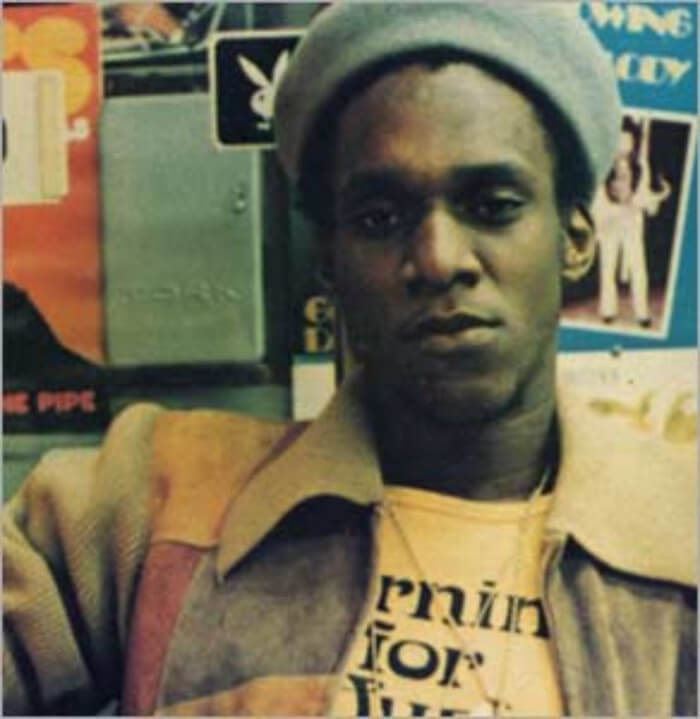
Don’t Cut Off Your Dreadlocks: The Start of a Production Legacy
Thompson’s 1975 album “Don’t Cut Off Your Dreadlocks”, produced by Bunny Lee, gained traction in the UK and Jamaica, setting the stage for a deeper creative role in the industry. Instead of working solely as a singer, he stepped into production—collaborating closely with his assistant Henry “Junjo” Lawes, who would become a cornerstone of the dancehall era.
At around the same time, Linval also founded his independent label, Thompson Sound, through which he would go on to produce and release many of his most iconic works.
By 1978, Linval had signed with Trojan Records and released the hit album “I Love Marijuana” along with its dub counterpart, “Negrea Love Dub”. Recorded at Channel One Studios, the album featured legendary musicians like:
- Aston “Family Man” Barrett (The Wailers) – Bass
- Leroy “Horsemouth” Wallace – Drums
The project showcased Linval’s evolving vision—balancing spiritual lyrics with deeper rhythms and sonic experimentation.
Pioneering Dancehall: Roots Radics, Scientist & Dub Innovation
As reggae transitioned into the dancehall era in the early 1980s, Linval Thompson was already ahead of the curve.
Working with the emerging Roots Radics Band at Channel One and sending tracks to Scientist for mixing, Thompson helped shape the sound of modern Jamaican music. Their collaborations led to some of dub’s most iconic albums:
- Scientist Meets the Space Invaders (1981)
- Scientist Encounters Pac Man (1982)
Thompson had constructed his own dubscapes as well, on Negrea Dub, Green Bay Dub, and Outlaw Dub.
In 1982, he produced Freddie McGregor’s breakout hit “Big Ship (Sailing on the Ocean)”.
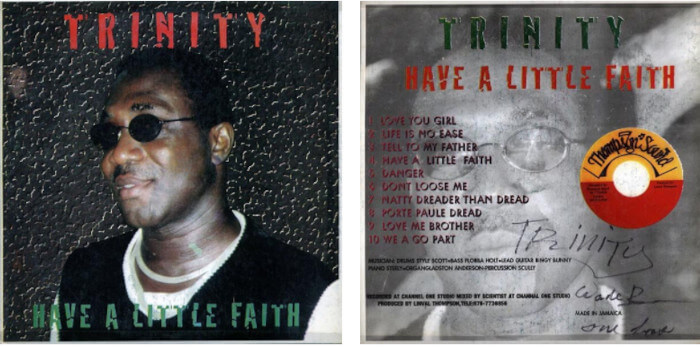
The Shift to Real Estate and Selective Recording
As the 1980s progressed and digital production techniques started dominating reggae, Linval Thompson stepped back from the scene. Never a fan of the computerized sound, he shifted focus to real estate while continuing to make occasional studio appearances.
In 1988, he reunited with Robbie Shakespeare for the album Starlight, a return to the organic instrumentation and spiritual depth that marked his earlier works.
Rediscovery in the 1990s: Reissues and Reappraisal
The 1990s saw a resurgence of interest in Thompson’s catalog, with many of his classic albums being reissued, including:
- Jah Jah Dreader Than Dread
- Ride on Dreadlocks
- Channel 1 Rockers
This reappraisal positioned him alongside reggae greats like Johnny Clarke, Horace Andy, and Cornel Campbell. Critics and collectors alike began to recognize the richness of his discography and the influence of his early production style.
A Legacy Continued: Dub Landing and 21st Century Work
Linval Thompson remained active into the 21st century, contributing to select compilations and performing live for niche reggae audiences. His two-part compilation series Linval Presents Dub Landing Vol. 1 & 2 (2018) featured a wealth of rare tracks from his production archives, reaffirming his impact on both roots reggae and dub music.
At Enki’s Music Records, we celebrate reggae’s key innovators—and Linval Thompson’s legacy is essential listening for any serious collector or fan of vintage Jamaican vinyl.
-
 King Tubby – Linval Thompson Meets King Tubby In Reggae Dub Style27,00€
King Tubby – Linval Thompson Meets King Tubby In Reggae Dub Style27,00€ -
 Linval Thompson – Six Babylon27,00€
Linval Thompson – Six Babylon27,00€ -
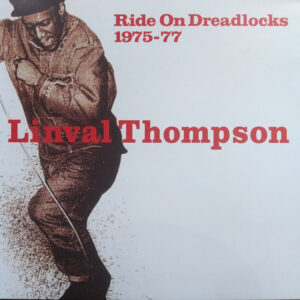 Linval Thompson – Ride On Dreadlocks 1975-197724,50€
Linval Thompson – Ride On Dreadlocks 1975-197724,50€ -
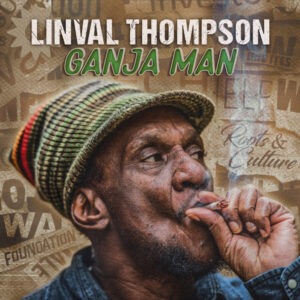 Linval Thompson – Ganja Man24,00€
Linval Thompson – Ganja Man24,00€ -
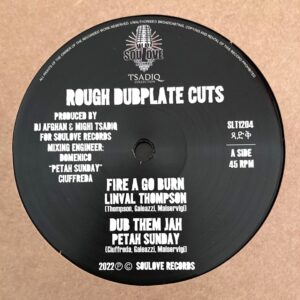 Linval Thompson & Trinity Meet The Tsadiq Section – Rough Dubplate Cuts14,90€
Linval Thompson & Trinity Meet The Tsadiq Section – Rough Dubplate Cuts14,90€ -
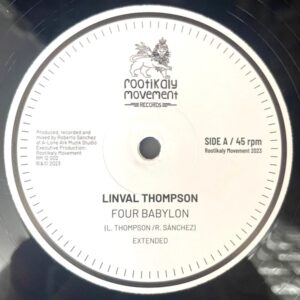 Linval Thompson – Four Babylon / Nytto Dread – Sound System14,50€
Linval Thompson – Four Babylon / Nytto Dread – Sound System14,50€ -
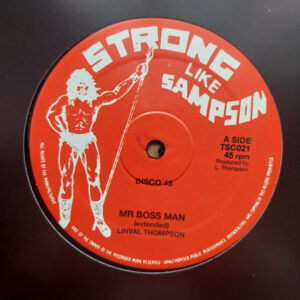 Linval Thompson – Mr. Boss Man / Ranking Trevor – Stop Pushing Me Around13,50€
Linval Thompson – Mr. Boss Man / Ranking Trevor – Stop Pushing Me Around13,50€ -
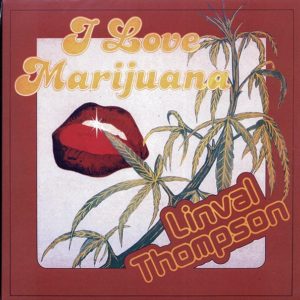 Linval Thompson – I Love Marijuana20,00€
Linval Thompson – I Love Marijuana20,00€ -
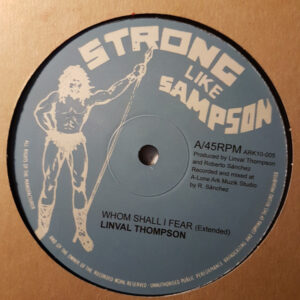 Linval Thompson – Who Shall I Fear / Fyah Ina Babylon13,00€
Linval Thompson – Who Shall I Fear / Fyah Ina Babylon13,00€
Records by Linval Thompson / Thompson Sound
Sources:
Nathan Bush allmusic.com
oldies.com
Photo credits: last.fm and Peter Verwimp

